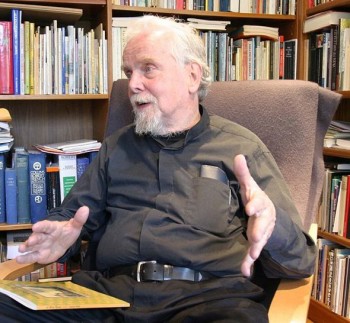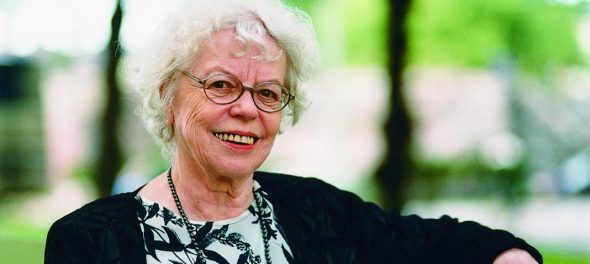Search results for "saarikoski"
Figuring out father
18 October 2012 | Extracts, Non-fiction
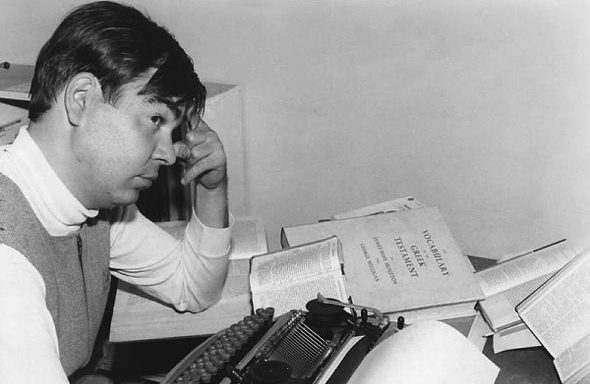
Pentti Saarikoski (1960s). Photo: Otava/Nikolai Naumoff
The poet and translator Pentti Saarikoski (1937–1983) jotted in one of his journals: ‘I have never cared for relatives.’ Thirty years after his death one of his five children set out to find out what his father was like – by reading almost all he left behind in writing; these comments by Saska Saarikoski are from his Sanojen alamainen (‘Servant of words’, Otava, 2012), an annotated selection of Pentti Saarikoski’s thoughts
Pentti Saarikoski died when I was 19. I remember complaining to my mother that I had not yet even got to know my dad. My mother answered: You’ve got plenty of time, the real Pentti is to be found in his books. She did not know how right she was, for she meant Pentti’s published books, not knowing what a mountain of texts awaited its readers in the archives of the Finnish Literature Society. Pentti had written everything down in his diaries.
I read Nuoruuden päiväkirjat (‘Youthful diaries’), published soon after Pentti’s death in 1983, as soon as they were published, but when his Prague, Drunkard’s and Convalescent’s Diaries appeared around the millennium, they went straight on to my library shelf. I was not terribly interested in the ramblings of Pentti’s alcoholic years.
It could be that my reluctance was influenced by the cool attitude I had adopted from early on in relation to my father. Other people were welcome to consider him a genius; for me, he was a father who did not telephone, write or come to see my football matches. I didn’t call him, either; for me, it was a father’s job. More…
Government Prize for Translation 2011
24 November 2011 | In the news
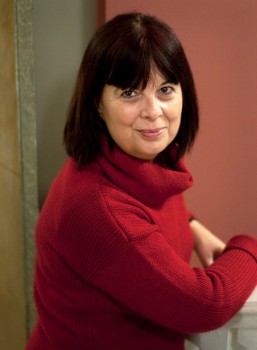
María Martzoúkou. Photo: Charlotta Boucht
The Finnish Government Prize for Translation of Finnish Literature of 2011 – worth € 10,000 – was awarded to the Greek translator and linguist María Martzoúkou.
Martzoúkou (born 1958), who lives in Athens, where she works for the Finnish Institute, has studied Finnish language and literature as well as ancient Greek at the Helsinki University, where she has also taught modern Greek. She was the first Greek translator to publish translations of the Finnish epic, the Kalevala: the first edition, containing ten runes, appeared in 1992, the second, containing ten more, in 2004.
‘Saarikoski was the beginning,’ she says; she became interested in modern Finnish poetry, in particular in the poems of Pentti Saarikoski (1937–1983). As Saarikoski also translated Greek literature into Finnish, Martzoúkou found herself doubly interested in his works.
Later she has translated poetry by, among others, Tua Forsström, Paavo Haavikko, Riina Katajavuori, Arto Melleri, Annukka Peura, Pentti Saaritsa, Kirsti Simonsuuri and Caj Westerberg.
Among the Finnish novelists Martzoúkou has translated are Mika Waltari (five novels; the sixth, Turms kuolematon, The Etruscan, is in the printing press), Väinö Linna (Tuntematon sotilas, The Unknown Soldier) and Sofi Oksanen (Puhdistus, Purge).
María Martzoúkou received her award in Helsinki on 22 November from the minister of culture and sports, Paavo Arhinmäki. Thanking Martzoúkou for the work she has done for Finnish fiction, he pointed out that The Finnish Institute in Athens will soon publish a book entitled Kreikka ja Suomen talvisota (‘Greece and the Finnish Winter War’), a study of the relations of Finland and Greece and the news of the Winter War (1939–1940) in the Greek press, and it contains articles by Martzoúkou.
The prize has been awarded – now for the 37th time – by the Ministry of Education and Culture since 1975 on the basis of a recommendation from FILI – Finnish Literature Exchange.
Reading matters? On new books for young readers
9 January 2014 | Articles, Children's books, Non-fiction
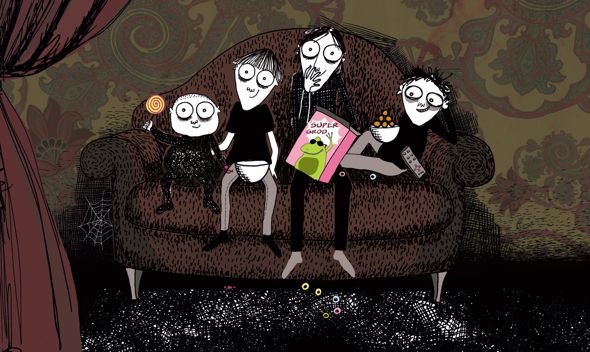
The Pixon brothers don’t read books, they love the telly: story by Malin Kivelä, illustrations by Linda Bondestam (Bröderna Pixon och TV:ns hemtrevliga sken, ‘The Pixon brothers and the homely shimmer of the telly’)
Finnish picture books for children have long been reliable export goods around the world. In the last few years, a number of novels for children have come along in their wake: works by authors such as Timo Parvela and Siri Kolu have been translated into a good many languages.
Now young adult literature has also blazed a trail on to the international market – in what also seems to be almost a matter of precision timing with regard to the Frankfurt Book Fair 2014. Finnish publishers have been investing in their home-grown lists of children’s and young adult books ever since the turn of the millennium, and now the time has come to harvest the fruits of their long-term efforts.
Fair game
23 October 2009 | This 'n' that
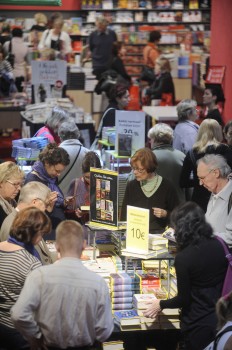
Words for sale: Helsinki Book Fair, 2009. - Photo: Suomen Messut / Kimmo Brandt
The Helsinki Book Fair opened yesterday (22 October), with the theme ‘What’s really happening’, at the Helsinki Exhibition and Convention Centre. Over four days there will be more than a thousand performers (mostly writers and their interviewers) and nearly 300 exhibitors. Last year’s Fair attracted 68,000 visitors.
The words of the theme are borrowed from a 1960s collection of poems (Mitä tapahtuu todella) by Pentti Saarikoski (1937–1983). According to the press release, the theme ‘sums up what literature is about’; moreover, ‘fiction and non-fiction reflect this very day, reinterpreting the past and present glimpses of what is to come’.
What’s really happening, it seems to us, is that inventing catchy titles for commercial purposes is an enterprise that should be undertaken with caution, as it may produce unintentional connotations for the delectation of those in the know… Mitä tapahtuu todella – its title borrowed in turn from none other than the Russian revolutionary Vladimir Ilyich Lenin – was a politically utopian collection in which Saarikoski expressed his belief in dialectical materialism and communism, contrasting American avant-garde art with the Marxist-Leninist utopia in which the writer wished to live.
In recognition of bicentennial 1809, the year in which Finland ceased to be part of the kingdom of Sweden and became an autonomous Grand Duchy of Russia, Sweden is under focus at the Book Fair, and is represented by 27 exhibitors and more than 30 performers. Writers from eight countries in all will visit the Fair, Russia taking part for the first time. Among the visitors are the writers Andrei Astvatsaturov and Herman Sadullajev and the translators Lyudmila Braude ja Anna Sidorova, who were awarded this year’s Finnish Government Prize for Translation.
The Fair is organised by The Finnish Fair Corporation in conjunction with the Finnish Book Publishers Association and the Organisation of the Booksellers Association of Finland.
Jarl Hellemann in memoriam 1920–2010
15 March 2010 | In the news
One of the grand old men of Finnish publishing, Jarl Hellemann, wrote in one of his own books: ‘Book publishing is by nature personified, a personal activity.
‘Most of the world’s old publishing houses still bear their founders’ names: Bonnier, Collins, Heinemann, Harper, Knopf, Bertelsmann, Werner Söderström, Gummerus. Americans ignorant of the exceptions to this rule among Finnish publishers still occasionally begin their letters, “Dear Mr Otava” or “Dear Mr Tammi”.’ (From Kustantajan näkökulma, ‘A publisher’s point of view’, Otava, published in Books from Finland 3/1999)
Hellemann himself was Mr Tammi for a long time; he started as a publishing editor at Tammi Publishing Company in 1945 and retired as managing director in 1982.
In 1955 he founded Keltainen kirjasto, the ‘Yellow Library’, an imprint of novels published since the First World War by prominent writers from all over the world. The first was Too Late the Phalarope by Alan Paton, the latest – published in 2009 – was The Disappeared by Kim Echlin. The series now contains more than 400 works, among them novels by 24 Nobel prize-winners.
Among the books in Keltainen kirjasto (list, in Finnish), Hellemann’s favourite was James Joyce’s Ulysses, translated by the poet and author Pentti Saarikoski in 1964. Hellemann continued choosing books for Keltainen kirjasto long after he retired.
Born in Copenhagen, Hellemann moved with his family to his mother’s home country, Finland, in the 1930s. Well-travelled and fluent in many languages, Hellemann himself published a novel (at the age of 25), three books on publishing and, in 1996, his memoirs.
Speaking about the heart
30 June 1991 | Archives online, Articles
New Finnish poetry, translated and introduced by Herbert Lomas
The ‘modernist’ revolution in Finnish poetry is now 40 years old, and the art must be ripe for changes.
Of course, the modernism of post-war Finnish poetry was not – except in Haavikko and to some extent in Saarikoski – extremely modernist. The poets were more interested in their content than their experiments. They were perhaps closer to ancient Chinese poets and early Pound than to Eliot in their elided brief juxtapositions and meditations on nature, society and moment-to-moment transience. The poets picked up a few liberties that unshackled them from metrical and rhyming formalities uncongenial to Finnish stress, syntax and phonemics; and they took off to speak about the heart. That is the strength of this poetry, and its originality, since all originality consists in being oneself – which includes one’s national self, and ultimately other people’s selves. And every generation still has to make a new start, admittedly in new circumstances, with the experience of its forefathers from birth to death. More…


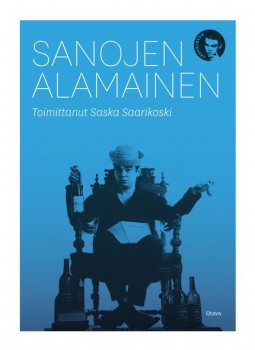 The poet and translator Pentti Saarikoski (1937–1983) was a legend in his own lifetime, a media darling, a public drinker who had five children with four women. His oeuvre nevertheless encompasses 30 works, and his translations include Homer and James Joyce. The journalist Saska Saarikoski (born 1963) has finally read all that work – in search of the father whom he seldom met. The following samples are from his annotated selection of Pentti Saarikoski’s thoughts over 30 years, Sanojen alamainen (‘Servant of words’, Otava, 2012; see
The poet and translator Pentti Saarikoski (1937–1983) was a legend in his own lifetime, a media darling, a public drinker who had five children with four women. His oeuvre nevertheless encompasses 30 works, and his translations include Homer and James Joyce. The journalist Saska Saarikoski (born 1963) has finally read all that work – in search of the father whom he seldom met. The following samples are from his annotated selection of Pentti Saarikoski’s thoughts over 30 years, Sanojen alamainen (‘Servant of words’, Otava, 2012; see 
